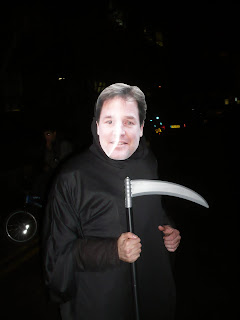
Yesterday morning I found myself knocking on a very ordinary-looking door on a terrace house in Finsbury Park. But I soon discovered that since 2002, some extraordinary work has been going on behind that door. Lives which had fallen apart and which were deemed unliveable and unbearable were pieced back together, and people were set back on the path to stability and contentment.
Sue Hessel and I have been campaigning on the issue of the Archway Bridge for a few months now, and we have been surprised and delighted by the response we have been continuing to get from the community. A residents’ group is re-forming to help campaign alongside us. A woman, who had previously jumped from a bridge and survived, contacted me to say that she wanted to get involved with our campaign. And just this week, we were contacted by Paddy Bazeley (pictured above with Sue and I), who is the founder of Finsbury Park’s ‘Maytree’, a ‘sanctuary for the suicidal’.
I have to admit to having some slight trepidations about our visit – what would a ‘sanctuary for the suicidal’ be like, exactly? As it turned out my fears were entirely unfounded. A more homely, welcoming and warm place I couldn’t imagine; a place where guests (not ‘patients’, nor indeed ‘clients’ or ‘service users’) can stay for five days and take things at their own speed. There’s no set programme, no ‘one size fits all’ approach, and no money is paid by guests because the centre is funded by donations and relies largely on volunteers. It has been shortlisted for a Guardian Charity Award for the last two years.
When guests leave, they are given a goodbye letter, which many people have said is something they take out and re-read at ‘wobbly’ moments. They will also be ‘linked in’ with services that will benefit them: Paddy told us that around 75% of people who kill themselves have had no help from or contact with mental health services.
Paddy excitedly told us that they are planning to open another centre in South London, and yet another in Bristol, thus spreading the good work of the team to yet more people in need. The people they help come from all backgrounds, and I asked Paddy what she thought the reason was for the three people who jumped to their deaths in as many weeks at the end of last year were all men, in their late 20s or early 30s? Paddy made an interesting assertion that the female suicide rate may be higher than national statistics would suggest because coroners are more likely to record an ‘open verdict’ with women, possibly because men are usually seen as the more likely gender to commit suicide.
“We have space for four people at any one time,” commented Paddy. “At the moment we have two empty beds. We are just down the road from the Archway Bridge. People need to know we are here.”
By a strange coincidence, the aforementioned woman who had contacted us about using her own experience of attempting suicide to lend weight to our campaign was herself helped by Maytree. I will keep her anonymous, but these are her words:
“I have experienced suicidal feelings numerous times since I was a teenager and often ended up in hospital following attempts on my life. Desperate to avoid a repeat of such occurrences I sought out a different kind of crisis help. In the past I had been locked up on psychiatric wards with no psychological help during the darkest of times.
I came across Maytree and after an assessment was allowed to stay for four nights. I have never experienced such a hopeful, loving and compassionate place. The staff - paid therapists and a wonderful diverse and excellently trained set of dedicated volunteers - listened to what I had to say, helped me to explore my distress and gave me a gentle space in which to figure out what I needed to do next in order to pull myself back towards life.
I shall never again underestimate the profound effect kindness, empathy, and straight forward human connection can have on the soul at the most desperate of times. Maytree was more than a sanctuary for me, it fed enough life back to me that I left with a renewed appetite for it.
I really appreciate the work you're doing towards this cause.”
Sue Hessel, my fellow campaigner, and also a counsellor, was hugely impressed by the set-up at Maytree. Sue said “What’s wonderful about Maytree is that it’s about meeting need. It isn’t run as a business with layers of bureaucracy, or with making money as the object. This is how things used to be before the NHS began to be taken apart, and it’s how things should be now: organic and with solid founding principles.”
We continue to demand that TfL, the police, Haringey Council, English Heritage, the Samaritans, NHS Haringey and the engineers with the net solution sit down around a table and make 2011 the year when these tragic and unnecessary deaths finally come to an end.
As well as a net to catch anyone who jumped, we are campaigning for the free ‘SOS’ phone through to the Samaritans be reinstalled. As Sue memorably put it yesterday “All we are asking for is a ‘phone like you get every few hundred yard on the motorway. It seems we can deal with vehicle breakdowns but not people breakdowns.”





